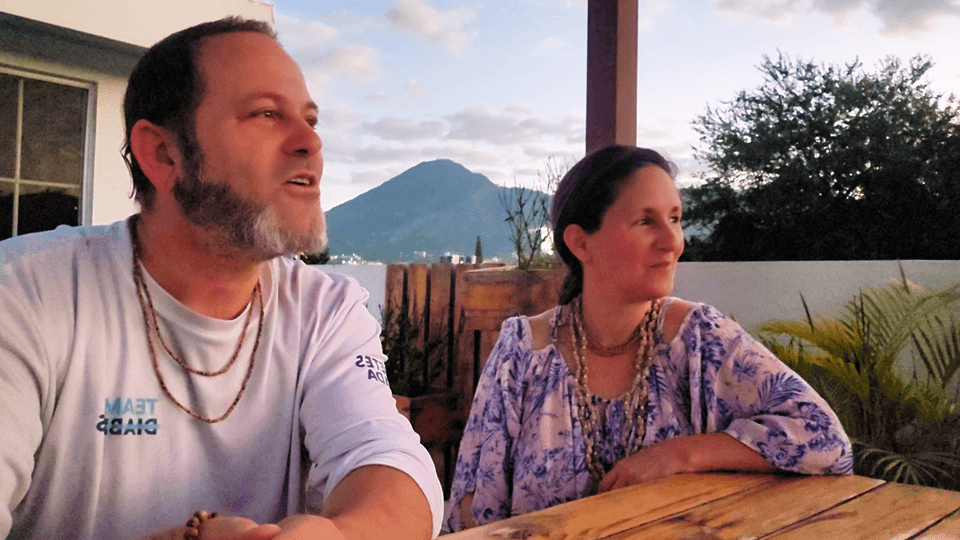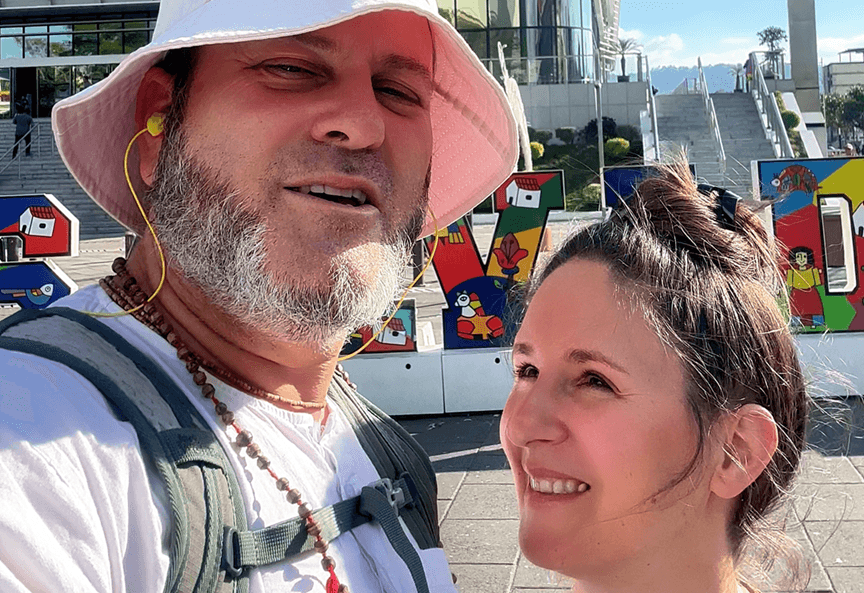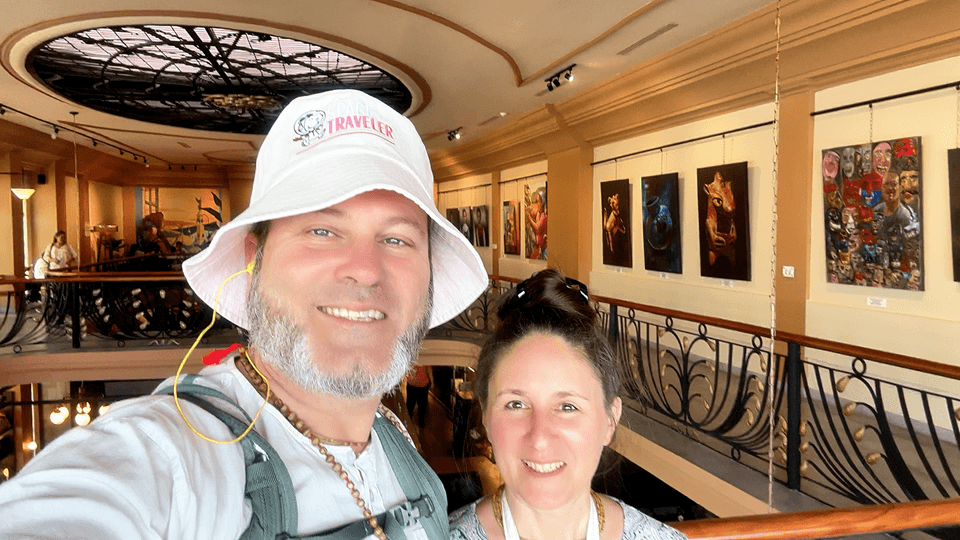Finding Light in Ancient Words: Chanting the Holy Names in the House of David
You know, some days the world just cracks your heart wide open. Sometimes the news is heavy, sometimes your own life is. There are mornings when you wake up to a call, a message, that someone you love has left their body. And everything stops, and you find yourself—eyes burning, hands half-closed—wondering: Where did they go? Where do we go? What am I, really, when I am not this body or this name or these flickering thoughts?
This is the space where old stories and sacred words live. This is where we—we being Mark and Maria, your friends from Juicy MagiK—pick up the Bhagavad Gita, sing out the holy names, and settle into the red cushions on our living room floor. Not experts. Just pilgrims, just friends, just two messy souls who love to chant, read, and gently wrestle with the big, soft mysteries.
Sitting With the Gita: Verse 2:12 and What It Means for Us
“Never was there a time when I did not exist, nor you, nor all these kings; nor in the future shall any of us cease to be.” Bhagavad Gita, Chapter 2, Verse 12. It sounds simple—pretty, almost, like something you’d embroider on a pillow or leave in a fortune cookie. But stop for a second. That’s Krishna, the blue-skinned one, talking to Arjuna in the middle of the toughest battle of his life, telling him: We’ve always been here. We’ll always be here. This part of us, this essence, is deathless.
A verse like that can shake you, especially when life feels fragile. The commentary of the Bhagavad Gita-As It Is opens up this statement, explaining how, in the Gita’s world, souls are eternal, not just empty bodies borrowing oxygen for a while. We’re not only our flesh and our fears—we are also something that’s never touched by death.
And sometimes, right when you need it, an old teaching returns with the softness of a mother’s hand. These words have held us, both of us, in times of grief, in the middle of illness, or when we feel not quite “at home” in these bodies.
What Are We Made Of? And Who Are We, Beneath All This Stuff?
Sorry if these questions sound heavy. We ask them because, well, not asking doesn’t make the ache any smaller. So, who are we? Mark remembers as a kid being obsessed with skeletons, dead fish on the beach, the stray bones poking from the sand. Fascinated, but also a little spooked. Trying to understand: What is this pile of bones? How does the “me” fit in here?
Maria, meanwhile, remembers feeling for a long time that scriptures were just confusing. She tried to read a bunch, they all seemed to contradict each other. Old stories with weird rules she couldn’t quite follow. Until—slowly, with the help of chanting, teachers, and repetition—things started to click in place. Each tradition, she says, has its strange bits and its treasures. Sometimes you don’t “get” the jewels right away. Sometimes you need to hear the same thing (about a trillion times) until you feel the truth ring out in your own heart.
This is why daily practice matters for both of us, simple things like reading a few verses, chanting together, sharing stories, or just remembering to breathe.
Suffering: The Old Question, the Unexpected Teacher
Suffering can feel pointless. Sharp, mean, unfair. But then you read (and read again) the teachings that say suffering is a signpost. It’s here to nudge you, to tip you out of numbness. In the Gita, Krishna keeps telling Arjuna that the real self isn’t hurt by swords, burned by fire, or washed away by water. Body comes and goes, but there’s something shining on the inside. As VivekaVani puts it, “That which has a beginning must have an end.” But the soul, the real “you,” doesn’t start or finish.
Mark remembers a long illness, the kind that leaves scars and new questions. After his diabetes diagnosis, he went out to the desert with his godfather, Paul Nakatsu—a real Zen master, the type that drops stillness into every silence. They talked about staying or leaving. At his lowest point, facing thoughts of ending it all, Mark told his godfather: “I’m gonna stay.” Paul just nodded, “The best is yet to come.”
And, you know what? He was right. Sometimes suffering is the gate that swings open just wide enough for a sliver of light. And sometimes that light is just the chance to change your mind, to notice the world is bigger, softer, stranger than you knew.
David, Saul, and the Healing Power of Song
You don’t have to be Hindu, or Christian, or any label really, to see the magic in different faiths. The story goes that King Saul was tormented by demons—bad dreams, maybe, or dark clouds that wouldn’t leave him. Only David, quiet shepherd with his harp, could calm the storm. He sang out God’s Name, Adonai, and the darkness lifted. If you watched this story in an episode (yeah, we do watch a little TV sometimes, if it’s got some old tales in it), you might see how quickly that chord can snap you back from fear.
In the same way, we find that chanting names—whether it’s Krishna, Rama, Adonai, Allah, or just a joyful, ringing, open “Hari Bol”—can shift a room in seconds. Try it. We’ve done it a thousand times, and still, a good kirtan or simple mantra can freshen the air like the rain after a long dusty week.
This isn’t just wishful thinking. People have found healing and a sense of peace from repeating sacred sounds for as long as words have been spoken. There’s science on how mantra meditation resets the brain and stories from every continent about the ancient power of holy song. The show got this right—one clean note, one word for God sung aloud, and the “demons” scatter.
What Is Chanting, Really? Why Do We Keep Doing It?
If you’ve stuck with us this far, maybe your heart is a little hungry for singing, too. Chanting isn’t just for “experts” or folks with perfect pitch. It’s for anyone who wants to touch a bit of the infinite. Sometimes the chant is just a few syllables. Sometimes it rambles and purrs and brightens, almost by itself.
There’s something beautiful about repetition. It’s simple, it’s cheap, it’s always available. We chant, sometimes together and sometimes alone. On beads, in the car, under our breath—during the dishes, after the news, before sleep.
This practice comes straight from the Gita’s world, and even more from teachers like Lord Chaitanya. He left behind a handful of simple prayers that can open a heart on the greyest day. Maria loves the third one especially. It’s a melody of humility, patience, gratitude—all the best stuff for drying up sorrow and watering hope.
Here’s a quick comparison of types of chant we find helpful:
| Chant Type | Language | Feels Like | Purpose |
|---|---|---|---|
| Hare Krishna Mahamantra | Sanskrit | Upward, clear, full | Cleans the heart, steadies mind |
| Adonai (Davidic) | Hebrew | Gentle, anchoring | Soothes grief, calms storms |
| Gauranga Breath Out | Sanskrit | Soft, expansive | Simple, easy any time |
| Any Loving Name | Any! | Familiar, intimate | Connection, playfulness |
No style is “right.” If you like it, it’s right for today.
Making Space: Music, Routines, and Turning Down the Noise
If you’ve tried listening to modern news or the radio lately, maybe you’re with us in needing a break. Sure, there’s stuff we need to know, but if you let all that chatter in too often, it’s like pouring hot sauce on a sunburn. Turning off the TV, stepping away from the headlines, lets new space in your head. Then music—real music, sacred music—can enter. Low hums, bells on a string, a playlist of chants that connects breath to something wider.
Put mantras in the background next time you make tea. Put chanting on before sleep (quietly, if the walls are thin). Invite the names in and let the air get lighter. We do, as often as possible. Sometimes with friends, sometimes just together, Mark and Maria, two goofy souls doing what we can.
If you want to go deeper, the official Bhagavad Gita ‘as it is’ includes full commentary and translations. Many find their own chanting community or satsang to support daily practice; you can even visit Juicy MagiK Agora to join our gentle online discussion space.
Wrapping Up: Small Steps on the Big Path
We never mean to sound like we “know” anything final. We are just grateful: for Krishna’s words to Arjuna, for the magic in a name, and for the odd, wonderful chance to sing, read, and question all these mysteries, with you. If you feel lost sometimes, or tired, or just so deeply uncertain, know that you’re not alone. Return to the names. Open the Gita—or any book that feels alive to you. Ask, sing, or just sit and breathe. That’s enough.
We hope today—by reading or chanting or even humming quietly to yourself—you feel a little lighter. May peace be with you and upon you, as Mark and Maria always say. Come back and join us anytime for more stories, souls, and songs.
For more on spiritual practice, or to support the projects we care about, feel free to check out the Juicy MagiK projects page.
And if your heart aches, remember: Never was there a time when you did not exist, nor will you ever cease to be.
Let’s keep singing the names, together. Hari Bol, Namaste, and goodnight.
TLTRExcerpt
Recent Posts

Last Night in San Salvador: Christmas Blessings, Winter Solstice & Chanting With a Sweeter Mood

We found El Salvador’s National Library, Then The Cathedral Pulled Us In

Our Tiny San Salvador Video Turned Into a Whole Blessing (Starbucks Changas and All)

We Saw Christ With His Arms Wide Open, So We Talked About Love (No Labels)
